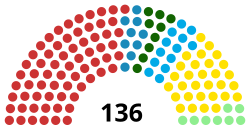Parliament of Romania
|
Parliament of Romania Parlamentul României |
|
|---|---|
| LV Legislature | |
 |
|
| Type | |
| Type | |
| Houses |
Senatul Camera Deputaților |
| History | |
| Founded | 1862 |
| Leadership | |
| Structure | |
| Seats | 136 Senators 329 Deputies |
 |
|
|
Senate political groups
|
Government (76) Parties Supporting the Government (9)
Opposition (51) |
 |
|
|
Chamber of Deputies political groups
|
Government (174) Parties Supporting the Government (38)
Opposition (117) |
| Senate committees |
15
|
| Chamber of Deputies committees |
14
|
|
Joint committees
|
Standing Committees
Special committees
Inquiry committees
|
| Elections | |
| 1992 – 2008, 2016 - present: Closed list, D'Hondt method 2008 - 2016: Mixed member proportional representation |
|
| 1992 – 2008, 2016 - present: Closed list, D'Hondt method 2008 - 2016: Mixed member proportional representation |
|
|
Senate last election
|
December 11, 2016 |
|
Chamber of Deputies last election
|
December 11, 2016 |
|
Senate next election
|
2020 |
|
Chamber of Deputies next election
|
2020 |
| Meeting place | |
| Palace of the Parliament, Bucharest, Romania | |
| Website | |
| http://www.parlament.ro/ | |
Government (76)
Parties Supporting the Government (9)
Opposition (51)
Government (174)
Parties Supporting the Government (38)
Opposition (117)
The Parliament of Romania (Romanian: Parlamentul României) is the national legislature of Romania, consisting of the Chamber of Deputies (Camera Deputaților), and the Senate (Senat). Its meeting place is at the Palace of the Parliament in Bucharest.
Prior to the modification of the Constitution in 2003, the two houses had identical attributes. A text of a law had to be approved by both houses. If the text differed, a special commission (comisie de mediere) was formed by deputies and senators, that "negotiated" between the two houses the form of the future law. The report of this commission had to be approved in a joint session of the Parliament. After the 2003 referendum, a law still has to be approved by both houses, but each house has designated matters it gets to deliberate before the other, in capacity of "deciding chamber" (Romanian: cameră decizională). If that first chamber adopts a law proposal (relating to its competences), it is passed on to the other one, which can approve or reject. If it makes amendments, the bill is sent back to the deciding chamber, the decision of which is final.
In 2009, a referendum was held to consult the population about turning the parliament into a unicameral body and reducing the number of representatives to 300. Although the referendum passed, the results are not binding, a referendum explicitly mentioning the modification of the constitution being required to achieve this.
...
Wikipedia
